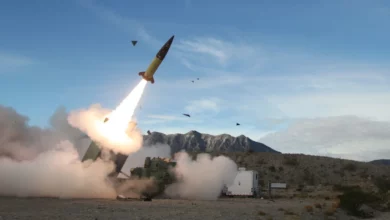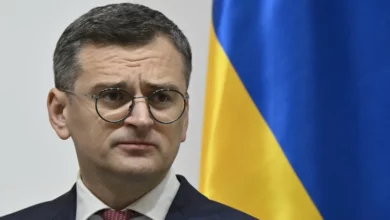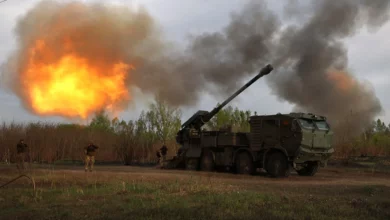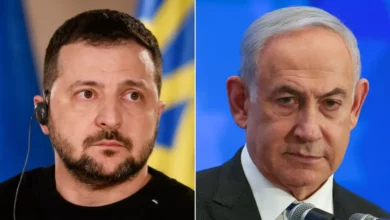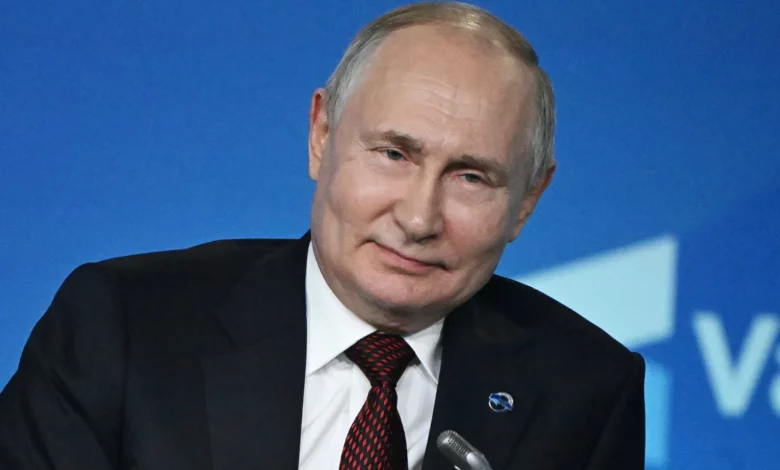
State news agency RIA Novosti quoted Putin as saying the “last successful test of the Burevestnik, a global-range cruise missile with a nuclear installation, a nuclear propulsion system, has been conducted.”
Putin was speaking at the Valdai Forum in Sochi.
The program to develop the Burevestnik was announced by Putin in March 2018 as part of a broader initiative to develop a new generation of intercontinental and hypersonic missiles. Among them were the Kinzhal ballistic missile and the Avangard hypersonic glide vehicle. Addressing the West, he said in that speech: “Listen to us now.”
Putin told the Federal Assembly in March 2018 that the goal was to ensure a strategic balance in the world for decades to come, including the Burevestnik and Sarmat missiles.
“It is a low-flying stealth missile carrying a nuclear warhead, with almost unlimited range, unpredictable trajectory and ability to bypass interception boundaries,” Putin said then.
However, Western analysts say the program has since run into trouble, with a number of failed tests. In 2019, the Nuclear Threat Initiative (NTI), an open source analytical group, said that “there is a consensus in the press, with purported agreement from U.S. intelligence services, that the Burevestnik has been tested 13 times, with two partial successes.”
The NTI quoted Russian military expert Alexei Leonkov as describing the Burevestnik as a weapon of retaliation, which Russia would use after Intercontinental Ballistic Missiles to finish military and civilian infrastructure and not leave a chance of survival.
Also in his speech at the Valdai Forum, Putin said that it is possible to revoke the ratification of a treaty banning nuclear tests.
“The United States signed the corresponding international act, document, treaty banning nuclear weapons tests, and Russia signed it. Russia signed and ratified, and the United States signed but did not ratify,” Putin said in Sochi.
The Russian president added that he sees it fit to “mirror the manner of the United States” and revoke Russia’s ratification.
“But this is a question for the State Duma deputies. In theory, this ratification could be revoked. If we do this, it will be quite enough,” Putin noted.
Underground nuclear testing was banned by the 1996 Comprehensive Nuclear Test Ban Treaty. The US and China signed the treaty, but they haven’t ratified it.
Moscow did ratify the treaty, but Putin said in February he would order a test, if the US moves first, adding that “no one should have dangerous illusions that global strategic parity can be destroyed.”
According to Putin, Russia has “almost finished to work on the modern types of strategic weapons” and now it is only a matter of bureaucratic procedures to “move on to their mass production and put them on combat duty.” He said it will be done soon.
Putin noted that he is not ready to say whether Russia needs to conduct tests in order to check if the new weapons are working efficiently, but as a rule his experts advise him to.
A CNN report in September revealed that Russia, the US and China have all built new facilities and dug new tunnels at their nuclear test sites in recent years, according to satellite images, at a time when tensions between the three major nuclear powers have risen to their highest in decades.
While there is no evidence to suggest that Russia, the US or China is preparing for an imminent nuclear test, the images, obtained and provided by a prominent analyst in military nonproliferation studies, illustrate recent expansions at three nuclear test sites compared with just a few years ago.
“It’s very clear that all three countries, Russia, China and the United States have invested a great deal of time, effort and money in not only modernizing their nuclear arsenals, but also in preparing the types of activities that would be required for a test,” said retired US Air Force Col. Cedric Leighton, a former intelligence analyst.
Putin claims Ukraine war not about territory
Meanwhile, Putin, who has laid bloody siege to Ukraine for nearly 20 months in an effort to conquer large swaths of Ukrainian land, on Thursday claimed the war is not a conflict over territory – but instead about “principles.”
“The Ukraine crisis is not a territorial conflict, and I want to make that clear. Russia is the world’s largest country in terms of land area, and we have no interest in conquering additional territory,” Putin said at the Valdai Forum.
Tens of thousands have been killed, entire towns and villages wiped out and billions of dollars of infrastructure destroyed since Putin’s invasion of Ukraine began on February 24 last year. Meanwhile, the Russian president has attempted to annex four Ukrainian regions in violation of international law to add to the Crimean peninsula occupied by Moscow’s forces since 2014.
But on Thursday, Putin claimed that Russia was not “attempting to establish regional geopolitical balance,” in Ukraine. Instead, he said the issue was “about the principles underlying the new international order.”
The denial of these principles, one of them being “a balance in the world where no one can unilaterally force or compel others to live or behave as a hegemon pleases,” is what causes conflicts, Putin claimed, apparently referring to the West.
Western elites “need an enemy to justify the need for military action and expansion” and made Moscow into one, Putin claimed.
Putin is a staunch proponent of what he calls a “multipolar world order,” promoting structures such as the BRICS group of emerging economies as a counterweight to US- and Western-led institutions that have harshly condemned Russia for its war on Ukraine.
He has previously attempted to justify his brutal war by claiming Ukraine’s aspiration to join NATO was a dire threat to Russia, that his invasion was a mission to “de-Nazify” Ukraine, and has emphasized his view that Ukraine is part of Russia, culturally, linguistically and politically. He has even compared himself to the 18th century Russian czar, Peter the Great.
Ukraine has rejected these arguments and repeatedly said it will not cede any territory to Russia.

